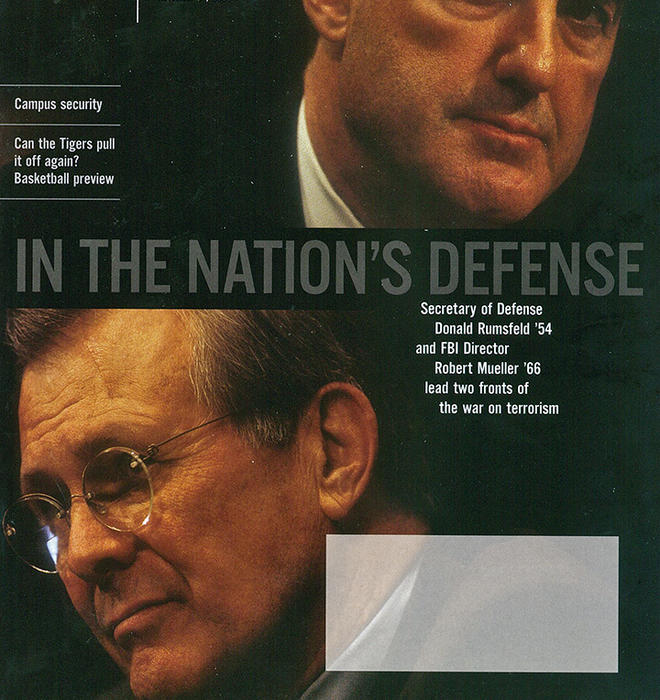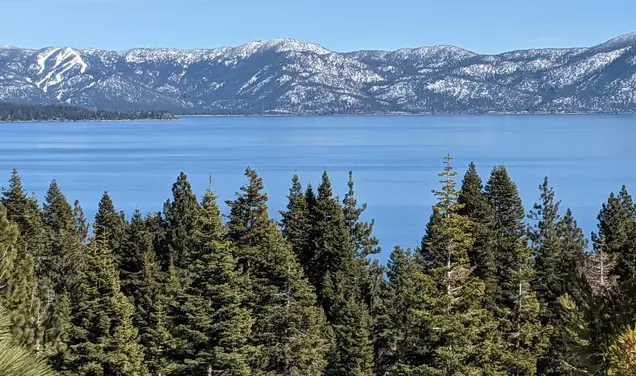
For the Defense
From the PAW Archives, November 2001: Vietnam War hero and hard-charging U.S. attorney Robert S. Mueller III ’66 tackles the biggest challenge of his life
The following profile appeared in the Nov. 21, 2001, issue of PAW, shortly after Robert S. Mueller III ’66 began his 12-year tenure as director of the FBI.
It happened during a U.S. Marine Corps combat patrol in South Vietnam’s Quang Tri Province. On the 11th of December 1968, an infantry platoon led by Second Lieutenant Robert Swan Mueller III ’66 suddenly came under automatic weapons and grenade fire from a battle-hardened company of North Vietnamese regulars. Within a matter of minutes, Mueller’s platoon had taken half a dozen casualties.
According to the Marine Corps, here’s what took place next: “Quickly establishing a defensive perimeter, Mueller fearlessly moved from one position to another, directing the accurate counterfire of his men and shouting words of encouragement to them. With complete disregard for his own safety, he then skillfully supervised the evacuation of casualties from the hazardous area and, on one occasion, personally led a fire team across the fire-swept terrain to recover a mortally wounded Marine who had fallen in a position forward of the friendly lines.”
Thirty-three years ago this December, Mueller won the Bronze Star, the Purple Heart, and the Vietnamese Cross of Gallantry because of his heroics as a platoon point man in Vietnam.
Now the 57-year-old Mueller is about to be tested again.
After being sworn in as the FBI’s 10th director on September 4, the hard-charging Mueller – a powerfully effective former U.S. attorney who masterminded the Department of Justice convictions against both the Pan Am bombers and Panamanian drug trafficker Manuel Noriega – faces a very different kind of enemy.
This time, he will be directing the efforts of 11,000 worldwide FBI special agents in the struggle against the terrorists who brought down the World Trade Center towers and badly damaged the U.S. Pentagon on September 11, and who may continue to threaten the lives of Americans with a bioterror campaign conducted by mail.
Even as he leads the investigation into the murders of thousands of Americans and foreigners, however, Mueller must also do his best to solve a host of nagging problems that have tarnished the Bureau’s image in recent years. Those problems – which include computer breakdowns, intelligence failures, evasive and misleading public statements by FBI executives, and even an in-house spy scandal involving a Russian “mole” – have triggered half a dozen congressional and executive branch inquiries in recent years, while also provoking sharp criticism of the 93-year-old FBI from the U.S. media.
Mueller faces a daunting task, to put it mildly. That point was made with clarity by President Bush, who said while intro-ducing Mueller at a Rose Garden press conference last July 5: “The FBI has a great tradition that Mr. Mueller must now affirm – and some important challenges that he must confront.”
Mueller himself was quick to concede that the legendary “G-Men” of the once-fabled Bureau have taken more than a few public relations hits in recent days. Appearing before the U.S. Senate Judiciary Committee during confirmation hearings last summer, the soon-to-be-confirmed federal prosecutor told the gathered senators: “Despite all the positive things that can be said about the FBI, we all know that the Bureau’s remarkable legacy of service and accomplishment has been tarnished by some serious and highly publicized problems in recent years. . . . The FBI is far from perfect, and the next director faces significant management and administrative challenges. We must and we will confront these challenges squarely and forthrightly.”
Significant as they might have appeared to be in June, however, the FBI’s recent foul-ups were instantly crowded off the front page by the events of September 11.
Only a few weeks after Mueller was confirmed by the Senate without a single dissenting vote (and only a week after he reported for work at FBI headquarters on September 4), the terrorist nightmare began. According to recent reports, Mueller is now working 18 hours a day, directing a team of 4,000 FBI special agents in the struggle to solve the case by sifting through more than 100,000 tips from potential informants scattered across the globe.
While the nation holds its collective breath, thousands of Americans are asking: How equipped – and how determined – is this crackerjack federal prosecutor to identify and then bring to justice these international murderers?
Former U.S. Attorney for the Western District of Virginia John Edwards ’66 is “absolutely convinced” that Mueller will “get it done” as FBI chief. “Bob Mueller is perfect for the Bureau,” says Edwards, a fellow Marine whose career has paralleled Mueller’s in many ways (both also attended the University of Virginia Law School after Princeton). “The Bob Mueller I knew was quiet, thoughtful, focused, and diligent. He was also incredibly determined. Mueller has always been a complete professional as a federal prosecutor. And he’s totally honest – what you see is what you get. There’s not a lot of show, if you know what I mean.”
Ord Elliott ’66, today a management consultant in Palo Alto, California, and also a former Marine Corps officer who was decorated in Vietnam, agrees. “Mueller is a rock-solid guy with a lot of guts. The job of platoon commander in Vietnam was a microcosm of the job he has now. In a jungle situation, you have to deploy your troops effectively, although you can’t see everything around you because of the terrain. And that’s the challenge he faces right now in combating these terrorists. I’m sure he’ll use the Marine Corps approach to run the FBI.”
Frank MacMurray ’66, who now practices law in Portland, Oregon, remembers Mueller as hardworking, serious, and “remarkably loyal.” “I also think he was highly unusual in his dedication to public service,” says MacMurray. “Remember, with his background at St. Paul’s and Princeton, he could have easily ended up on Wall Street. But instead, he chose the Marine Corps, and then a career as a federal prosecutor. I think those choices are going to stand him in good stead now, because he’s earned his stripes – both in the military and in law enforcement.”
What financial consultant and former Mueller roommate Joe Luongo ’66 remembers best about the new FBI chief was his determination to succeed in everything he did. Says Luongo: “Bobby Mueller was one of the most relentless guys I’ve ever met.”
Born in New York City on August 7, 1944, Mueller grew up in affluent circumstances on Philadelphia’s Main Line. As a student at St. Paul’s School in New Hampshire, he excelled both in the classroom and on the lacrosse field. After earning a politics degree at Princeton, he signed on with the Marines, and completed a three-year hitch that took him to Vietnam, where he was wounded and won numerous commendations in addition to those mentioned above.
Returning to the States, Mueller headed for Charlottesville, Virginia, where he distinguished himself as a member of the Law Review and as an outstanding student lawyer whose impeccable credentials soon landed him a coveted job at the prestigious firm of Pillsbury, Madison & Sutro in Palo Alto, California. But the hard-working and fiercely competitive Mueller quickly grew restless in private practice, and decided to take a fling at prosecuting criminals. After signing on as an assistant U.S. attorney for the District of Northern California in 1976, he rose quickly to become chief of the Special Prosecutions Unit (1980) and then chief of the Criminal Division (1981).
One of the people who knew Mueller best during his early years as a California-based federal prosecutor is lawyer Dan Lyons, who worked side by side with him for two years in the U.S. Attorney's Office in San Francisco. According to Lyons, who is now in private practice in Wilmington, Delaware, Mueller was an “amazingly dedicated” prosecutor who was the first to arrive at the office each morning and the last to leave at night.
But Lyons also describes Mueller as “very low-key” and “understated,” adding: “He was utterly determined in everything he did. For example, one year several of us were in a running club, and we were running almost every day. Well, Bob wasn’t part of that. He was too busy working. But one day we told him about this seven-mile race we were going to run in. You go straight up and down the hills just north of San Francisco, and it’s an absolutely brutal climb. We told Bob about it, and he said, ‘I’m going to run with you – and I’m gonna finish.’ And we couldn’t believe it. We warned him: ‘You have to be in top condition for this race, it’s absolutely grueling.’ But Bob wouldn’t listen. And he showed up that day, and he ran the damn race. And he finished it. We could hardly believe our eyes. I said, ‘You Marines think you can do everything, don’t you?’
“He looked at me, and he said: ‘You’re goddam right!’ ”
A year after Mueller became chief of the Criminal Division in San Francisco in 1982, Boston's U.S. Attorney (and soon-to-be Massachusetts governor) William F. Weld tapped him to run the same unit in the District of Massachusetts. Within four years, the star prosecutor had climbed the ranks to become the U.S. attorney for Massachusetts – a meteoric rise punctuated by one headline-grabbing courtroom conviction after another. As Weld would later tell a reporter from the New York Times: “Mueller simply knew his stuff. And there was no swagger to him, no strut to this guy at all.”
By now, the high-profile Mueller had begun to draw the attention of high-ranking figures in the Department of Justice. In 1989, lightning struck in the form of a phone call from President George Bush’s attorney general, Dick Thornburgh, to Mueller’s office in Boston. Would he be willing to help direct the enormously complicated and politically sensitive prosecution of Panamanian dictator Manuel Noriega on drug trafficking charges?
Mueller was on the next plane, and the long, arduous, and ultimately successful process of securing the Noriega conviction was soon under way.
During the next few years, while spearheading the successful prosecution of the Lockerbie Pan Am bombers, along with several other high-profile cases, Mueller would continue to make friends and influence people in Washington. His growing political clout at the Justice Department and the White House would pay its largest dividends early last summer, after the resignation of FBI Director Louis Freeh, whose eight-year tenure at the Bureau had been marked by endless wrangling with his boss, then Attorney General Janet Reno, and her boss, President Bill Clinton.
By then, of course, George W. Bush had been elected to the White House and had named John Ashcroft as his attorney general. Both men soon made one thing perfectly clear: They wanted the next FBI director to be a “team player,” a super-loyal manager with longstanding ties to the Department of Justice.
Enter Bob Mueller.
A clean-cut, athletic-looking figure who instinctively favors the dark suits, plain white shirts, and conservative ties that had defined the image of the “FBI Special Agent” until the mid-1970s, Mueller was the perfect choice: an experienced federal prosecutor with a dazzling record of convictions, a loyal Republican, a dedicated family man with two grown daughters, and a Marine Corps veteran of impeccable personal character whose Bronze Star and Purple Heart spoke for themselves.
According to several Department of Justice insiders, Mueller wanted the job badly – and he won it not only because of his track record, but also because of his reputation for dogged, unswerving loyalty to his friends and colleagues. “There’s no doubt that Bob was a superb candidate for the job,” says one longtime observer of DOJ politics. “But there were several terrific candidates vying for the post. I think Mueller won the competition for two reasons. First, he was an aggressive prosecutor, whereas the last three FBI directors (Freeh, 1993—2001; William S. Sessions, 1987—93; William H. Webster, 1978—87) had all been federal judges before taking over the Bureau. I think the president and the attorney general decided that they wanted somebody who would be more aggressive in the job, rather than somebody with a judicial temperament.
“The other reason is loyalty. There’s no doubt that Director Freeh sometimes chose to ignore directives from Janet Reno and Bill Clinton, because Freeh was often struggling hard to keep the Bureau from being seen as ‘covering up’ information during the various Clinton scandals. But Clinton is gone now, so that problem is solved. And Mueller is viewed by the brass at the DOJ as absolutely loyal to his superiors in the chain of command. Remember, we’re talking about a decorated Marine Corps war hero. He knows how to take orders, and how to give them.”
How will Mueller go about the process of smashing the international terrorist organizations, even as he reforms the management structure of the deeply troubled FBI?
According to one veteran DOJ attorney who prefers not to be identified, the conservative Mueller will almost certainly attempt to “bring back some of the values that dominated the old FBI of pre-Watergate days. I predict that you’re going to see a lot more dark suits and plain ties,” says the attorney. “I also predict that in many ways, Mueller will be a throwback to earlier days, when every special agent was either a lawyer or an accountant, and when the Bureau was tightly managed from the top down.”
Nicholas Katzenbach ’43, former attorney general under President Lyndon Johnson, shares this assessment. In Katzenbach’s view, the Bureau needs to recover some of the enormous management strength that it displayed under the 48-year leadership of J. Edgar Hoover (1924—72). “There is a good deal to be said for confidentiality and keeping law enforcement out of politics,” Katzenbach says. “Similarly, there is a good deal to be said for Hoover’s military-like discipline, for his policy of keeping individual agents out of the press (no comments, no pictures) and giving all credit for success to the organization, not individual agents. He may have been excessive and certainly was arbitrary, but it helped to maintain public confidence. There is a narrow line to be walked here.
“Today, I think, some of that secrecy and discipline should be restored. There should [also] be a major effort to work with the CIA, which Hoover regarded as his greatest enemy next to Communism. In short, I think strong and tough administration should be a priority.”
Mueller himself provided some clues as to how he will attempt to swiftly improve the Bureau’s performance last summer during a lengthy appearance before the Senate Judiciary Committee in Washington. While vowing to dramatically upgrade the Bureau’s technical infrastructure – and to nurture “mutual trust and respect” between the FBI and sister agencies such as the CIA and the National Security Council – Mueller pledged that his tenure would be marked by openness, candor, and the willingness to admit and quickly correct mistakes.
“You should know,” he told the senators, “that I understand the necessity to move quickly on administrative and management issues. In prior positions, I have made changes swiftly, as soon as I was confident that I had the benefit of all views and was convinced that the proposed changes would indeed improve the organization.”
Only seven days after being sworn in and going to work on his long shopping list of “management issues,” however, Bob Mueller watched helplessly – along with millions of other Americans – while the twin towers of the World Trade Center and a large section of the U.S. Pentagon were reduced to rubble. In the space of an hour or so, the U.S. had been plunged into a new kind of war — an open-ended terrorist conflict full of frightening and unpredictable dangers.
Once again, the point man of Quang Tri Province would be tested to the fullest.
How will he perform?
Gardner F. Gillespie III, a Mueller pal from law school days and now a partner at Hogan and Hartson in Washington, D.C., says he learned on a Virginia lacrosse field just how determined Bob Mueller can become once he has set his eyes on a goal. “I played club lacrosse with Bob while the two of us were in law school,” Gillespie recalls. “He was a midfielder, and very good at the game. Very tenacious and determined. Once the game started, he was one of those people you could always depend on.
“He was definitely a hard-charger,” Gillespie says. “If I were in a pickle, he’s the guy I’d want to get me out.”
Freelance writer Tom Nugent is the author of Death at Buffalo Creek (W. W. Norton, 1973).






No responses yet